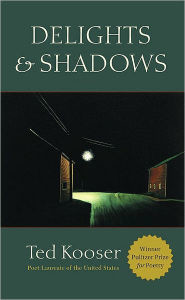I hadn’t read any of Ted Kooser’s work before, though I’d certainly heard of him. I opened this early collection at a random spot and started to read rather quickly.
I wasn’t particularly impressed: the rather ordinary language didn’t exactly sing to me and the insights—while making me smile—didn’t make me gasp. However, after a few poems, a sense of well-being stole over me, almost a sense of familiarity. Perhaps I had read them before after all? Or had somehow heard this voice?
I found myself thinking of the title of Alice Munro’s 2012 story collection Dear Life. And of Sonia Sotomayor’s memoir My Beloved World. There was something in this short, seemingly simple poems that I needed. I went back and reread them more carefully.
“Tattoo” recounts a moment at a yard sale: seeing an old man whose tattoo of “a dripping dagger held in the fist / of a shuddering heart—is now just a bruise”, a lingering ache “where vanity once punched him hard”—a brilliant line. Note how the images do double duty: a bruise that is the blurred blue of an old tattoo and also a lingering ache, a punch that vanity requested being also like the needles that poked ink into his skin.
There is no mockery here, only fellow-feeling as the author notes the traces of youthful arrogance. The man is still strong and has “the sleeves of his tight black T-shirt / rolled up to show us who he was,” yet we see him as an old man, “picking up / broken tools and putting them back,” the broken tools again doing double duty. And the final line takes us back to the image at the beginning, now shimmering with all that we have learned about this man and all men in just these few lines.
There is a depth of compassion in these poems and a recognition of the small moments that illuminate what it means to be human. In “At the Cancer Clinic” we see a woman being helped across a waiting room by two others, perhaps her sisters, to where a nurse waits patiently. There’s the slight chuckle at calling the nurse patient, the sympathy at the woman’s slow progress, and then the surprising ending that elevates the scene into an evocation of what is best in all of us.
Another poem I loved is “Skater”. Having myself not started skating until middle age and being quite proud that I finally managed a waltz jump—a baby jump, the easiest of all—I thrilled to this joyous description of landing it, of how that experience changes you. Adding to the joy are the bright colors and the image of her skates braiding a path on the ice, echoing her ponytail in the first line.
My friend Dave has much to say against poetry that seems like prose. When I read the last poem in the book, I thought of him and how this could be prose if written without the line breaks. However, reading it again I saw how the images of time and fading light suggest the idea of aging, even death, with calm acceptance, even perhaps with gratitude for a life well lived.
A Happy Birthday
This evening, I sat by an open window
and read till the light was gone and the book
was no more than a part of the darkness.
I could easily have switched on a lamp,
but I wanted to ride this day down into night,
to sit alone and smooth the unreadable page
with the pale gray ghost of my hand.
Have you read any of Ted Kooser’s poetry? Do you have a favorite poem of his?
